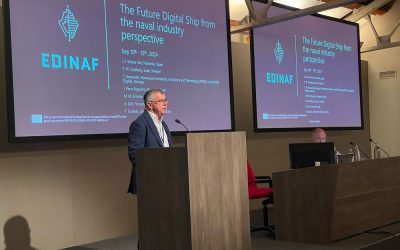The Naval Architect: July/Aug 2019
On 15 May, Nantong Mobile Joint Investment Promotion Bureau Cruise Manufacturing Co., Ltd. and Ericsson (China) Communication Co., Ltd. successfully opened the 5G NSA Base Station at the Haimen facilities of China Merchants Heavy Industry (Jiangsu), realising the first coverage and application of 5G technology in the shipbuilding industry.
China Merchants Cruises, Nantong Mobile and Ericsson have completed the 5G network coverage of China Merchants Cruises Manufacturing Haimen Plant and plan to jointly explore 5G and Augmented Reality (AR) for auxiliary production applications based on smart ship design and maintenance. AR will be used to superimpose information for industrial intelligent applications such as remote device installation and maintenance, rapid inspection, and device interaction. Moreover, the three parties will jointly carry out research on the use of 5G-based unmanned aerial vehicles for the factory inspection plan, and further explore the needs of other manufacturing scenarios based on 5G technology.
The arrival of the 5G+ Shipbuilding project has greatly improved the industrial intelligence level of the shipbuilding industry and laid a solid foundation for the application and development of 5G technology in the field of intelligent manufacturing. Field tests have shown that the new network’s speed is nearly 20 times that of the existing 4G network.
Based on the characteristics of mobile 5G ultra-high speed and ultra-low latency, the project team deployed a 4K HD camera and a live panoramic camera in the production facilities of China Merchants Cruise Line. This live 4K broadcast and panoramic video was relayed via cable to the showroom streaming media server. In the exhibition hall, users can view a large screen or use VR headsets to watch the block assembly and the shipyard docking process in real time. Through the deployment of VR panoramic live broadcast, China Merchants Cruise Management can monitor production progress and personnel safety in real time.
“A perfect VR experience is not only the same as the real scene but also smoother,” said Gu Jun, a 5G technology expert at Nantong Mobile. “A few seconds of VR video, data traffic can reach several hundred megabytes. VR is extremely slow in transmission so the delay must be kept to milliseconds to alleviate the visual ‘dizziness’. The high rate and low latency characteristics of 5G networks solve these problems.”
Strategic agreement
In addition to China Merchants Heavy Industry, CSSC’s shipyards are also actively promoting the application of 5G technology. On 24 April, its subsidiary Shanghai Waigaoqiao Shipbuilding Co., Ltd. (SWS) signed a 5G strategic cooperation agreement with China United Network Communications Group Co., Ltd at the Shanghai New International Expo Centre. According to the agreement, the two sides will actively explore a variety of innovative cooperation models to jointly promote the application of 5G in the shipbuilding industry.
According to reports, Waigaoqiao Shipbuilding and China Unicom Shanghai Company will together build a pilot demonstration of 5G-based industrial Internet applications in the marine industry. The two parties will use the 5G network to support the digitalisation of the shipbuilding process. This innovative application research into the industrial Internet will look at the use of 5G and related technologies as a means of overcoming the bottlenecking that can occur during the production process.
In developing a concept known as ‘SWS-Time’, the project aims to achieve a breakthrough in the connection and sharing of “people, machine, material, method and ring” throughout the whole process of shipbuilding, design, application, supply chain management, on-site production, safety, quality, precision management and Big Data. It is hoped its application will improve the company’s digital management level and promote the high-quality developments at Waigaoqiao Shipbuilding.



